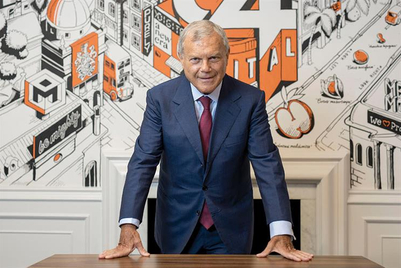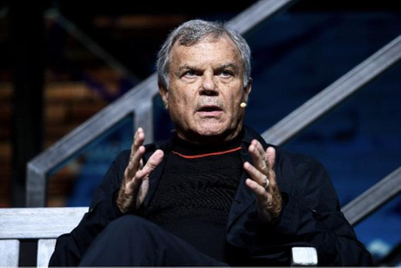
Calling in via video-link from New York, Sorrell addressed the close to 300 attendees who were at the JW Marriott this morning to listen to 40 world-class speakers, participate in discussions and network.
Compared with the keynote Sorrell gave the year before, the WPP chief sounded slightly more optimistic. “The picture should be... that is when we look at our business and compare it with GDP growth either nominal or real... slightly better than last year,” he said.
While even Sorrell is hesitant to credit WPP with the same dominance as the world's GDP, he did disclose that the group's forecasts of its own GDP was about 4 per cent. “So I feel a little bit better about 2014,” he said crediting in part the Sochi Olympic Winter Games.
Nevertheless, with the rise of finance and procurement, there is no doubt that clients are extremely cautious, particularly post-Lehman. “People are not making the numbers by top-line growth, it's by cutting costs, and global growth is still below trend,” said Sorrell.
When Quest asked for the reasons driving that caution, considering the vast sums being funnelled into the global economy, Sorrell responded that the fast-growth markets had slowed. “One of our competitors reported on Thursday that in the 4Q of 2013 they were -11 per cent in China and -5.6 per cent in the BRICS, so clients who were heroes six or 12 months ago are regarded as those to be avoided because they have too much [invested] in fast-growth markets.”
Sorrell, however, believes this assumption to be false. “I think the slowdown we see in the fast-growth markets is an opportunity," he said. "I always regret despite the fact that those markets are 30 to 31 per cent of our business, that we haven't gone faster over the last 10 years in Asia, Latin America, Africa, Middle East and Eastern Europe.”
It is ludicrous, he continued, that these markets have become 'albatrosses'. “CNBC forecasted that in 25 years, China will be the world's biggest economy at about $34 trillion with the third-biggest economy as India.”
Changing tack, Quest brought up the subject of WPP losing its top-spot when the Publicis-Omnicom Merger comes through and whether Sorrell will be on the acquisition trail to get WPP “back on top”.
“I think it was Bloomberg—I'm sorry to mention another competitor [to CNN]—that performed a two-year analysis of deals, and I believe we were number one in terms of acquisition activity and over a three-year period we were number two to Google and the third company was Intel,” said Sorrell coolly.
Regarding Quest's query about the delay in the deal between Publicis and Omnicom, Sorrell noted that the agencies had one more regulatory hurdle to jump, and that was China. “I have heard that the Chinese advertising association has raised some concerns in relation to the content industry... not competition among agencies," he said. "But the more fundamental point is, what we're beginning to see with POG is the disagreements starting to surface about who will run the business. Who will be the CFO, where the business will be run from, where the PR business will be run from, whether the media business will be consolidated like GroupM or not?…. And all these issues are starting to come to the fore. And there are of course, a number of technical issues. If you have an Amsterdam listing and a US listing and concerns from the French government about French national champions being subjugated to American national champions... it's all raising hackles.”
What WPP has to do, continued Sorrell, is four things: “Focusing on new markets. We want it to be 40 to 45 per cent of our business. We also want digital to grow from 35 per cent to 40 to 45 per cent. Data is 25 per cent, and just to push this point, we have a real data business not a mythical data business based on third-party data…. Today $4.5 billion of our $18 billion in revenues comes from data investment management. And the fourth of our strategy is what we call horizontality: getting our 175,000 people in 110 countries to work together more effectively.”
The conclusion, said Sorrell, is that WPP wants to do things smarter, not just bigger.
“What about the conflict between the media investment side of the business and the creative side?” asked Quest.
“What we've done is recreate the full-service agency of the 1960s and 70s, just in a different form across WPP,” responded Sorrell. “You're not going to get the toothpaste back in the tube, the media groups have been established and they've set a course impossible to go back on.”
In terms of the balance of power, however, Sorrell believes that things stand more or less on par between the media and creative agencies. That said, he believes the medium in many respects is more important than the message, with the media side of the business the primary driver and engine of growth.
“Today you develop and cultivate the message to fit the medium,” he said. “We manage a media book at GroupM that's at $75 billion. Our media buying and planing revenues are over $4 billion. If that was a client, we'd ask. Is that $75 billion the right figure? Where should it be spent? These things are much more complex and sophisticated than it's ever been.”



.jpg&h=334&w=500&q=100&v=20250320&c=1)


.jpg&h=334&w=500&q=100&v=20250320&c=1)
.png&h=334&w=500&q=100&v=20250320&c=1)
.jpg&h=334&w=500&q=100&v=20250320&c=1)






.png&h=268&w=401&q=100&v=20250320&c=1)


.jpg&h=268&w=401&q=100&v=20250320&c=1)
.jpg&h=268&w=401&q=100&v=20250320&c=1)